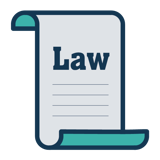How might this right be relevant to my life?
This protects our right to enjoy our possessions without interference, deprivation, or control of these possessions by a government or public body.
‘Possessions’ means things like land, property and objects you own, as well as shares, pensions, money, and certain types of welfare benefits.
Some examples of when your right to peaceful enjoyment of possessions might be at risk include:
- Blanket policies banning people from using their mobile phones while they are admitted to a mental health unit.
- If staff in a health or care service confiscate personal objects as a form of punishment. This might also affect the right to be free from inhuman and degrading treatment (Article 3) and the right to private and family life (Article 8).
- Policies on welfare benefits which have a worse impact on certain groups of people, such as carers, people with care and support needs, or survivors of domestic abuse.
- Social housing providers failing to adequately maintain property which could result in serious harm to tenants.
- If a public authority purchases property from an individual and does not pay them a fair amount for it.
You can ask the public official about their decision or action and ask them to tell you how it was lawful, legitimate and proportionate.
If you can think of a way to deal with this situation or decision that is less restrictive to you then you can raise it with the public official as the decision may not be proportionate.









